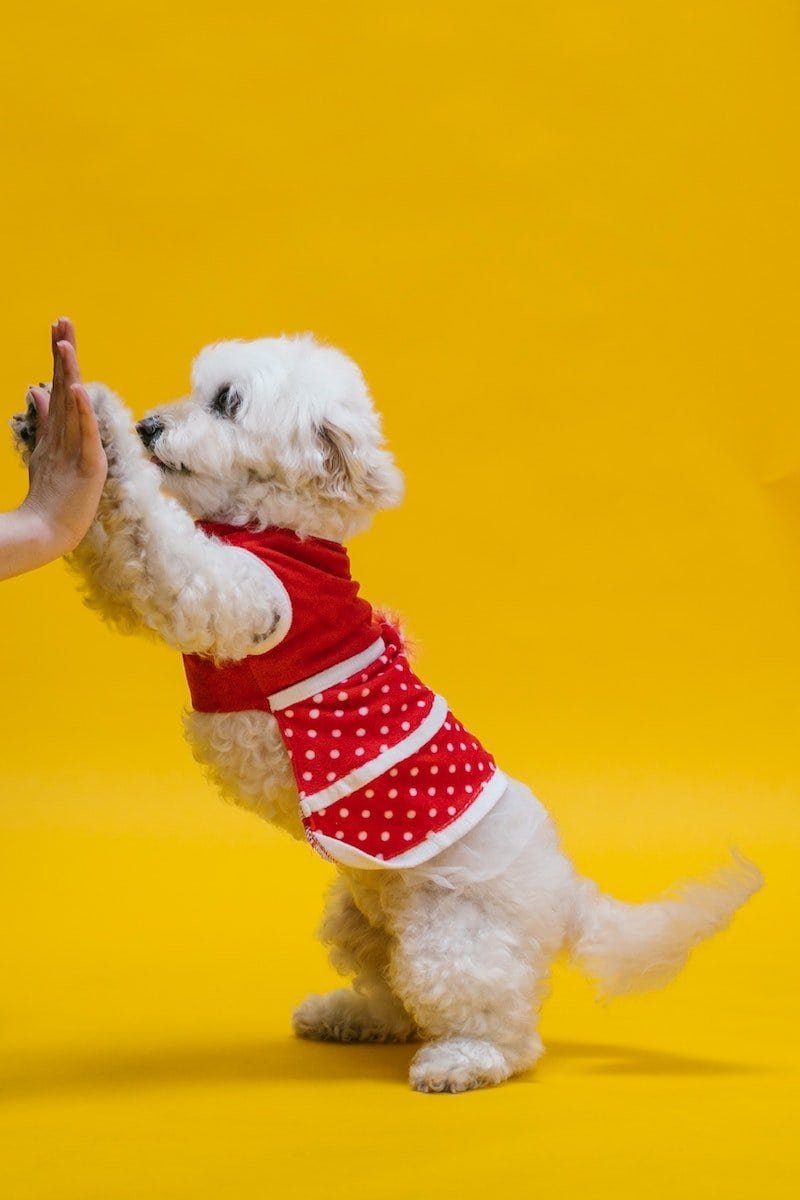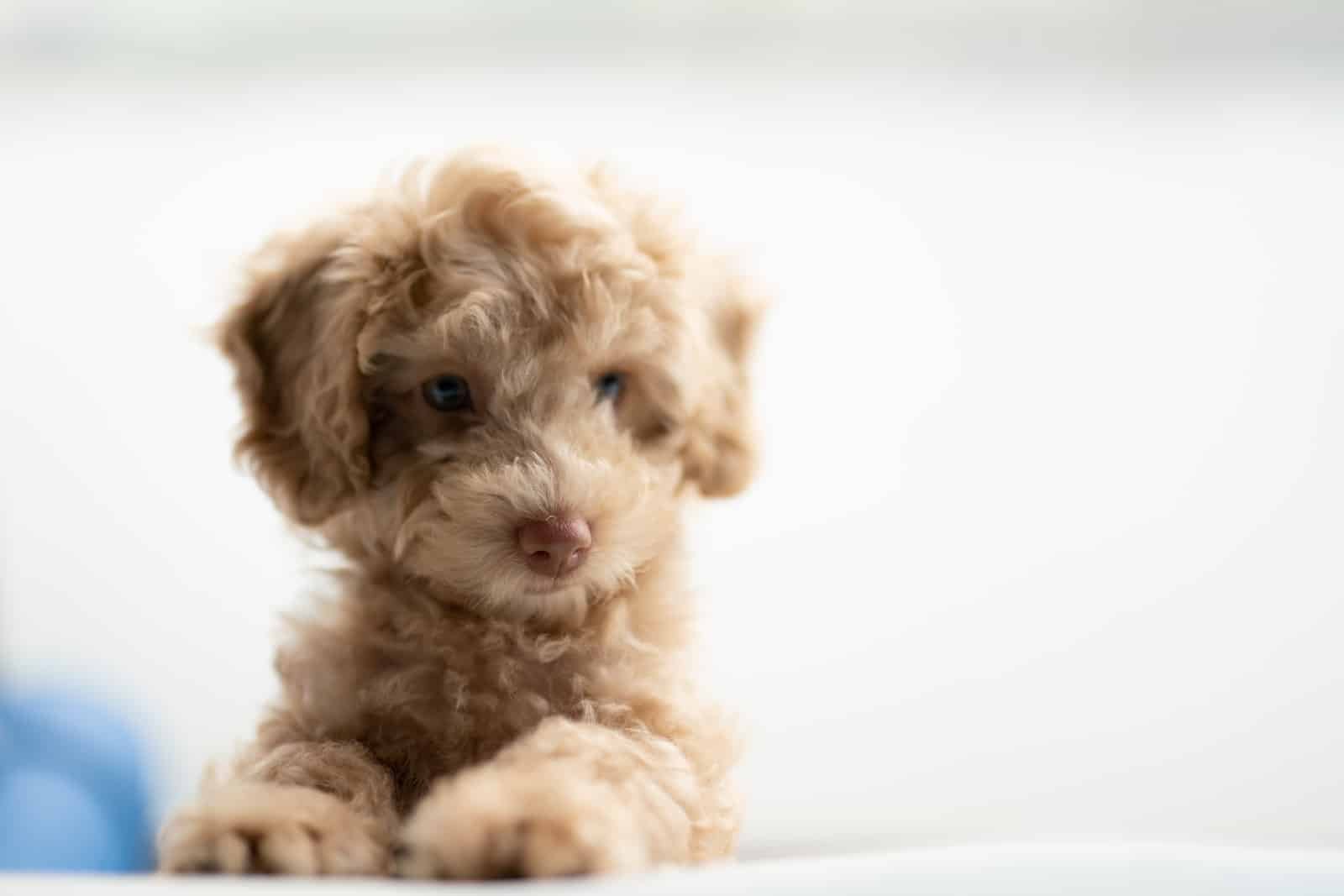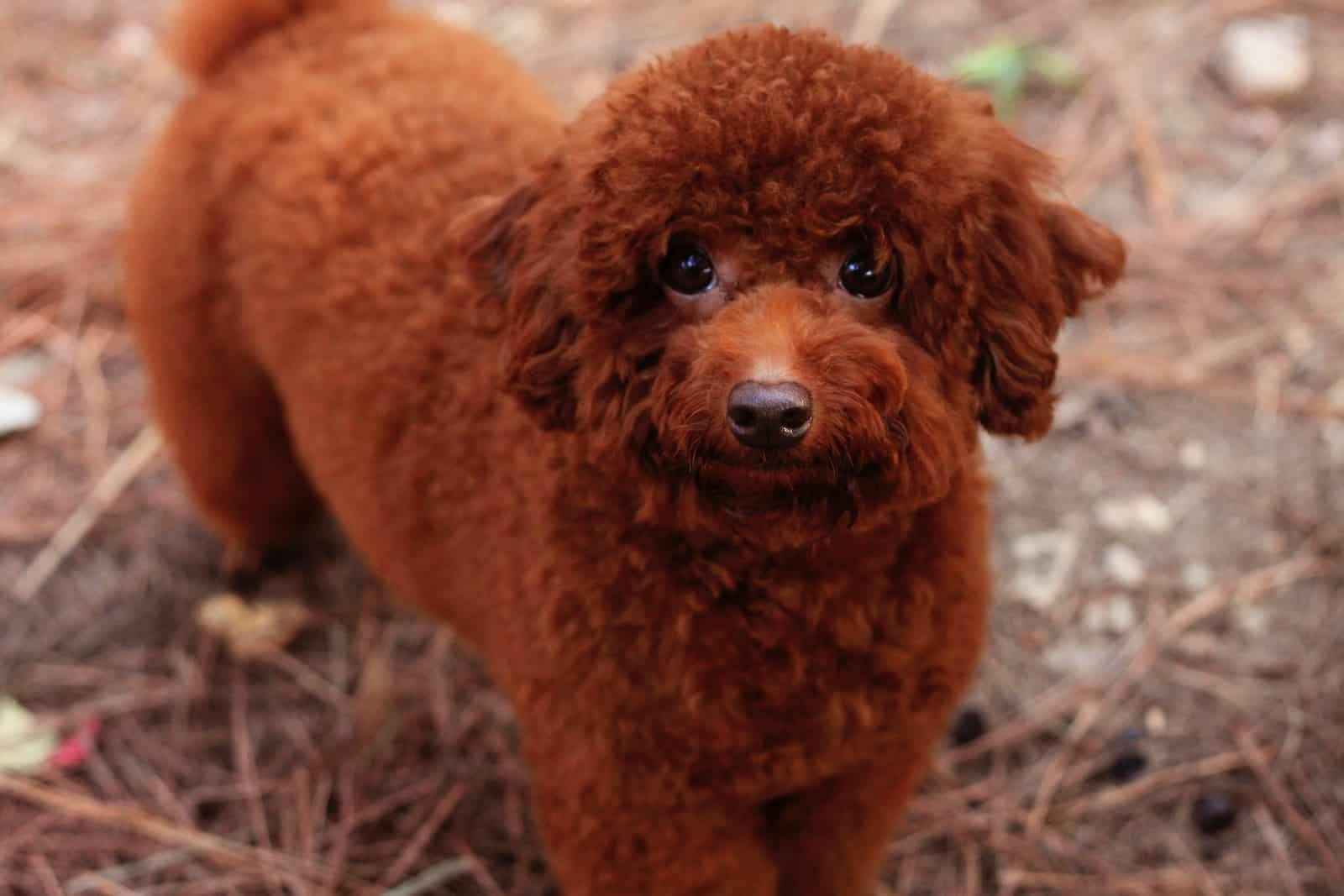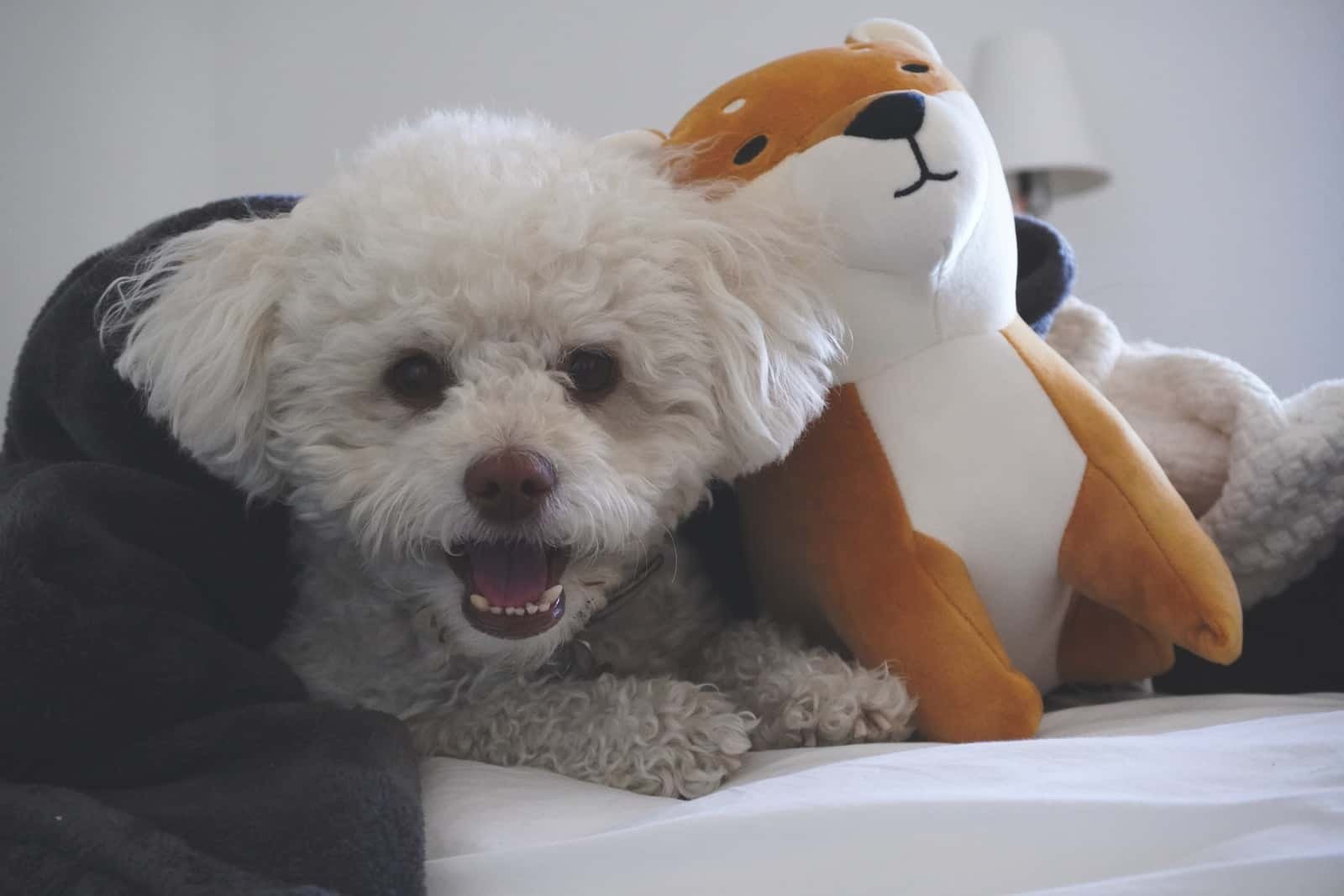
When you think about the poodle, what’s the first thing that comes to your mind? Is it their distinctive curly coat or perhaps their ability to strut in style at dog shows? While these are certainly notable aspects of this popular breed, there is so much more to a poodle’s personality and behavior than meets the eye.
The American Kennel Club (AKC) categorizes poodles into three sizes: Standard, Miniature, and Toy. Each type shares many common poodle traits, yet they can differ greatly in some aspects of temperament and behavior. Whether you want a poodle puppy or an adult teacup poodle for companionship, knowing these traits will help you prepare for a rewarding life with your new pet.
Poodles are known for their intelligence and eagerness to please – traits that make them highly trainable. From advanced obedience classes to mental stimulation games at home, this breed thrives when its mind is kept active. Don’t let their fancy looks fool you – these dogs are smart, quick-thinking, and agile.
Understanding Poodle Traits
Poodles are a distinctive breed, well-loved by many for their unique combination of traits. Their temperament, behavior and physical characteristics set them apart in the canine kingdom. Let’s delve deeper into understanding what makes poodles so special.

Exploring the Personality of Poodles
When it comes to personality, poodles certainly don’t disappoint. They’re known for their intelligent and friendly nature which makes them a popular choice among dog lovers. With advanced obedience classes, you’ll be surprised at how quickly they can grasp tricks and commands.
Their high mental stimulation needs keep them alert and active throughout the day. It’s not uncommon to find an adult standard poodle solving puzzles or engaging in interactive games with its owner!
However, there’s more to poodle personality than just smartness and friendliness. They’re also loyal companions who thrive on human interaction – adopting a poodle puppy could mean welcoming a bundle of joy that loves your company.
Physical Characteristics Unique to Poodles
Poodle traits aren’t limited to just their temperament – they have some remarkable physical features too! The first thing you’ll probably notice about any Standard or Miniature Poodle is their curly fur coat that comes in various colors.
The American Kennel Club (AKC) recognizes this breed in three sizes: standard, miniature and toy – each offering different aspects of the charming poodle character. For someone looking for less shedding dogs, adult teacup poodles might just be perfect!
Notably, size has no bearing on typical Poodle characteristics; whether it’s a Toy or Standard Poodle from American Kennel Club AKC – they all share similar traits like agility and graceful movement.
Poodle Temperament
When envisioning the regal and stylish Poodle, it’s easy to get lost in the intricacies of their curly coat and their poised gait. But, under the beauty is a complicated personality molded by intelligence, history, and distinctive breed qualities..
1. A Blend of Intellect and Emotion
Poodles stand out, not only for their striking physical appearance but also for their high intellect. They rank impressively on the American Kennel Club (AKC) intelligence scale, just behind Border Collies. This formidable intelligence, combined with their innate eagerness to please, makes them highly trainable. From agility courses to mind-stimulating games, Poodles thrive when challenged mentally.
But, intelligence isn’t their only strength. Poodles are incredibly emotionally attuned to their human counterparts. They form deep bonds with their families, showcasing a loyalty that’s both endearing and protective. Their sensitivity means they can often pick up on the moods of those around them, offering comfort during down times or sharing in moments of joy.
2. A Mix of Confidence and Caution
By nature, Poodles are typically confident dogs. They walk with a distinctive grace, belying a self-assuredness often seen in breeds of their stature. However, this confidence doesn’t necessarily translate into recklessness. Poodles can be cautiously curious, particularly around strangers or unfamiliar environments. While they’re not typically aggressive, their watchful nature can make them a bit reserved initially.
3. Social Butterflies with a Stubborn Streak
Poodles, regardless of size, tend to be sociable creatures. They enjoy the company of humans and other dogs alike. Given the right environment and early socialization, they can easily become the life of the party.
Yet, it’s worth noting that, like all breeds with a high degree of intelligence, Poodles can exhibit a streak of stubbornness. This trait, while endearing to some, can prove challenging during training sessions. Consistency and patience are crucial when navigating these moments of willful defiance.
4. Adaptability Rooted in History
The Poodle’s adaptability is, in part, a testament to its history. Originally bred as water retrievers in Germany, they later found favor among the French nobility, adapting seamlessly from hard-working hunting dogs to stylish companions of the elite. This versatility is still evident today, with Poodles easily fitting into various roles, from family pets to show dogs to therapy animals.
5. Companionship Over Solitude
Lastly, while Poodles value their independence, they lean heavily towards companionship. They thrive best in environments where they’re included in family activities, and prolonged periods of solitude can lead to feelings of neglect. Such feelings can sometimes manifest as negative behaviors, a stark contrast to their typically charming nature.
The Poodle’s temperament is a rich tapestry woven from threads of intelligence, loyalty, adaptability, and a dash of stubbornness. Understanding these intricacies can foster a deeper connection between Poodle and owner, ensuring a harmonious relationship that stands the test of time. Whether you’re considering adopting a Poodle or seeking to understand your curly companion better, delving into their temperament offers valuable insights into this iconic breed.

How Poodle Traits Influence Behavior
As we’ve seen from above, discussion on poodle traits such as intelligence and friendliness; these qualities influence their behavior as well. Training Poodles is usually easy because they are smart, but be consistent because they have a stubborn side too..
They’re sociable animals that enjoy meeting new people and dogs. While they are not typically aggressive, they can become protective if they sense danger, like the Golden Retriever Standard Poodle mix..
For activity levels, poodles require ample exercise to keep them happy and healthy. Outdoor playtime is important for the physical and mental health of both standard and miniature poodles..
To sum up: understanding poodle traits is key to appreciating this breed’s charm. This breed’s traits, both physical and mental, make it a favorite among dog enthusiasts.!
The Origin of the Poodle Breed
As we delve into the fascinating world of poodles, it’s crucial to understand their roots. The breed’s lineage provides insights into its characteristics..
Tracing the Poodle’s Lineage
Believe it or not, your beloved poodle shares more than just good looks with its ancestors. The American Kennel Club traces the poodle’s lineage back to Germany, where they were bred for water retrieving. This breed became famous in France as a retriever and circus performer because of their cleverness and special fur..
The three types of poodles you’ll encounter today – Standard, Miniature, and Toy – all share these historical roles in their DNA. Certain behaviors, such as a love for water or a talent for mental stimulation in games and advanced obedience classes, may be observed..
The Poodle: A Breed With Rich History
But there’s more to this history than meets the eye. At first, poodles were used for duck hunting because they were great swimmers. Later, French nobles started to keep them as pets, which is why we see them as posh dogs today.!
For instance, when you look at an adult standard poodle or even adult teacup poodles prancing around with what seems like an air of dignity – that’s centuries-old breeding shining through! And let’s not forget those distinctive clips seen on show dogs? They were initially meant as practical measures for hunting in cold water but have now become style statements.
Understanding the Origins of Poodle Traits
Given these origins, it won’t surprise you that many common poodle traits can be traced back to their early days as working dogs. Some classic examples:
- Pleasure in Work: Your dog’s joy in fetching balls stems from generations of retrievers who were trained to fetch waterfowl for hunters.
- Their experience of working in various climates, including chilly lakes and circus tents, has made them adaptable to different environments.!
- Intelligence and Trainability: The poodle’s work ethic is unparalleled, which isn’t surprising considering they had been trusted with complex tasks since their early days.
While it’s easy to get lost in the adorable fluffiness of a poodle puppy or the regal bearing of an adult standard poodle, remembering these historical traits can help you better understand your pet. Whether you own a miniature poodle or plan to adopt one, understanding its background can enrich your love for the breed..
Physical Characteristics of Poodles
Delving into the world of poodles, you’ll find a breed that’s as varied in size and coat as it is in personality. Let’s explore these features to better understand what sets this breed apart.
Varieties of Poodle Size and Their Traits
Poodle sizes range from large Standard Poodles to the compact Toy version, with Miniature Poodles fitting right in between. An adult Standard Poodle can stand over 15 inches tall at the shoulder – quite a contrast to their miniature counterparts who typically fall within the 10-15 inch range. The smallest variety, Toy Poodles, are less than 10 inches tall but they pack plenty of character into their petite frames.
Poodle Fur: More Than Just a Pretty Coat
A defining trait among all poodles is the curly or corded fur that adorns them. This unique coat isn’t just for show—it serves an important purpose by providing insulation against cold weather while also offering some protection from water. It’s worth noting that despite its luxurious appearance, poodle fur requires regular grooming to prevent matting and keep your furry friend looking their best.
Physical Strengths Unique to Poodles
As part of the American Kennel Club (AKC) ‘Non-Sporting’ group, it shouldn’t come as a surprise that poodles possess impressive physical capabilities beyond their elegant appearance. They’re agile athletes known for speed and endurance—a testament to their historical role as hunting dogs back in Germany where they originated.
General Temperament of Poodles
When it comes to temperament, don’t let those sophisticated looks fool you—poodles have more than beauty going for them! These dogs are renowned for being intelligent, active creatures with an outgoing personality. From standard sized down to teacup varieties, all share a love for mental stimulation which can be satisfied through advanced obedience classes, agility training or a good old-fashioned game of fetch. They’re also known for their loyalty and can form strong bonds with their families.
In summary, whether you’ve got an adult teacup poodle or are looking to adopt a standard poodle puppy, knowing these traits will help you understand your furry companion’s needs better. From the American Kennel Club to other notable canine organizations like the American Feed Control Officials (AFCO), experts agree that understanding breed-specific characteristics is key to responsible dog ownership.
So remember—whether it’s a golden retriever-standard poodle mix showing off its strength in the park or a toy poodle flaunting its finely groomed coat in your living room, each has unique qualities that make them special members of the dog world. With such diverse traits within one breed, there’s sure to be a perfect fit for every kind of lifestyle and home environment!
Poodles’ Intelligence and Temperament
With their elegant appearance and poised demeanor, poodles are one of the most recognizable dog breeds. Yet, beyond their distinctive curls lies an intelligence that’s often underestimated. This section delves into the depths of a poodle’s mind, exploring their remarkable traits in terms of intelligence and temperament.
Decoding Poodles’ Intelligence Levels
Believe it or not, your Standard Poodle has an intellect that rivals many humans! According to the American Kennel Club (AKC), poodles rank as the second most intelligent dog breed – right after Border Collies. Their smartness isn’t just manifested in understanding commands; they’re also quite adept at problem-solving. For instance, if you’ve ever seen a poodle working its way around a baby gate or finding hidden treats, you’ll appreciate their mental agility.
Understanding the Temperamental Side of Poodles
Poodle temperament varies between individuals, but they’re known for being friendly and good-natured dogs. Advanced obedience classes are ideal for Miniature and Adult Standard Poodles due to their willingness to learn and please..
However, like any dog breed, poodles can exhibit negative traits if not properly socialized or stimulated mentally. They may become anxious or excessively barky when bored. Therefore mental stimulation activities such as puzzle toys or interactive games can be beneficial for this breed.
How Intelligence and Temperament Shape Poodle Traits
It’s fascinating how intelligence and temperament interplay to shape unique poodle characteristics. Not only does this combination make them excellent family pets, but also agile competitors in obedience trials.
The AKC notes that standard poodles excel in skills such as tracking, retrieving items and following complex commands – all testament to their high intelligence levels. Meanwhile miniature versions often stand out with their lively spirit despite being small in stature.
Poodle Behavior around Children
Parents often ask – “how do poodles behave around children?” The answer is: quite well! Thanks to their patient and gentle temperament, the poodle personality makes them a great companion for kids. However, it’s essential to teach your child how to interact with a dog respectfully.
Poodle Behavior around Other Pets
How your poodle behaves towards other pets can be influenced by their intelligence and socialization.. Generally, they get along fine with other dogs and even cats, especially when introduced at a young age.
Poodle Behavior around Strangers
Poodles’ intelligence makes them wary of strangers and they take time to warm up to new people.. But don’t worry; with proper socialization techniques, your poodle can learn to welcome newcomers without hesitation.
When Poodles are Left Alone
Ever wondered what happens when you leave your adult teacup poodles alone? Due to their intelligence and close bond with humans, poodles may experience separation anxiety if left alone for long periods. Hence, adopting strategies like crate training or providing interactive toys during your absence can help keep them calm.
If you want to be a good pet owner to an adopted poodle puppy, understanding their intelligence and temperament is important..
Health Considerations for Poodles
When it comes to poodle traits, there’s more than meets the eye. Yes, they’re known for their distinctive looks and lively temperament. But being a responsible poodle owner also means understanding and addressing their unique health needs.
Nutritional Needs of Poodles and Their Impact on Health
Poodles, whether they’re standard or miniature, require a balanced diet to maintain optimal health. The American Feed Control Officials prescribe specific dietary requirements that can help you ensure your poodle is well-nourished.
- Protein: Essential for growth, especially in puppies.
- Carbohydrates: Provide energy and keep your dog feeling full.
- Fats: Great source of concentrated energy for active dogs.
- Fiber: Promotes healthy digestion.
Remember, nutritional needs vary depending on age, size (a toy poodle will have different requirements than an adult standard poodle), and overall health status.
Common Health Issues in Poodles: Prevention and Care
Like any dog breed, poodles are prone to certain health complications. Regular vet check-ups can help detect issues early on.
Poodle Grooming Needs
One key characteristic of the poodle breed – their coat – requires special attention. Regular grooming prevents matting and skin infections while promoting overall hygiene. A well-groomed poodle is not just about aesthetics; it’s crucial for their health too!
Exercise Requirements for Poodles: A Healthy Body Equals a Healthy Mind
Poodles are smart – an important trait often highlighted by the American Kennel Club (AKC). This intelligence necessitates mental stimulation as much as physical exercise. Combining activities like fetch with advanced obedience classes can promote both mental agility and physical fitness in your adopted poodle puppy or even adult teacup poodles!
Training for Positive Poodle Traits
Training isn’t only about teaching commands; it reinforces positive behavior traits while curbing the negative ones. Regular training from a young age can foster desired poodle personality traits and prevent behavioral issues down the line.
As you consider adding a golden retriever standard poodle or any other variety to your family, remember that understanding their health needs is as important as admiring their endearing poodle characteristics.
Training Your Poodle: What to Expect
Diving into the world of poodle training? Just like any journey, it’s essential to know what you’re getting into before you embark. This section helps set the stage for your understanding and expectations.
Understanding Your Poodle’s Individual Traits
Every poodle, whether a standard or toy variety, comes with its own unique personality. However, there are certain traits that are commonly seen across this dog breed. Known for their intelligence and keen sense of intuition, they’re often regarded as one of the most trainable breeds by the American Kennel Club (AKC). Yet, a trait that makes them stand out is their need for mental stimulation. Without it, your adult teacup poodles to your adult standard poodles could resort to destructive behavior as an outlet for pent-up energy.
Training Techniques Tailored to Poodle Traits
Given these particular poodle characteristics and temperament, training strategies must be tailored appropriately. Poodles thrive on advanced obedience classes which provide ample mental stimulation along with physical exercise. Remember though – always keep it positive! Negative reinforcement doesn’t work well with this breed’s sensitive nature.
This isn’t a Golden Retriever or a Standard Poodle showdown; each breed has distinct needs and methods of learning best suited to them. The key lies in understanding your individual pet’s character traits and adjusting your approach accordingly.
Expectations vs. Reality: Training Your Poodle
In theory, given their high trainability ranking by the AKC among other breeds, you might expect training your adopted puppy or adult teacup poodles will be a breeze. The reality could look different though.
Despite being quick learners due to their sharp intellects – remember those shared traits we talked about earlier – every dog comes with its own set of challenges too! For example, despite being generally sociable dogs known for their friendly nature (a great trait when it comes to training), their intelligence can sometimes lead them to be stubborn or independent.
Nonetheless, with patience, consistency and the right approach tailored to your poodle’s personality traits – you’ll find that your poodle is not just a beautiful breed but also an amazing companion. Training isn’t simply about teaching tricks; it’s about fostering a strong bond between you and your furry friend. So go ahead – embark on this journey with confidence!
Caring for a Poodle: Grooming and Exercise Needs
Your poodle, whether it’s a standard poodle or a miniature one, requires not just love but also meticulous care. Proper grooming and balanced exercise play significant roles in maintaining your furry friend’s health and enhancing those delightful poodle traits we’ve all come to adore.
Fine-Tuning Your Poodle’s Grooming Routine
The American Kennel Club (AKC) suggests that regular grooming is vital for any dog breed, but it’s particularly important when you’re caring for an adult standard poodle or even teacup sized ones. Their curly coats need frequent brushing to prevent matting and tangling. You’ll need to clip their hair every six to eight weeks as well.
For the uninitiated, here’s a quick rundown on some key points:
- Brush your poodle daily using a slicker brush.
- Regularly check ears for possible infections due to their floppy nature.
- Schedule professional grooming sessions if you can’t manage clipping at home.
Remember, grooming isn’t just about looks; it plays an essential role in your pet’s overall wellbeing too.
Balancing Exercise and Play: A Key Poodle Trait
Poodles are known for their energetic behavior and sharp intellect. These characteristics necessitate ample physical activity along with mental stimulation. Whether you’ve adopted a poodle puppy or an adult teacup poodles – they all love playtime!
Here are some ideas:
- Advanced obedience classes can be beneficial since this dog breed loves challenges.
- Regular walks will help keep them healthy physically while letting them explore offers mental stimuli.
- Interactive toys provide both entertainment and cognitive challenge.
Exercise isn’t merely about keeping them fit; it also helps channelize their energy positively, curbing any potential negative traits.
The Impact of Regular Care on Poodle Traits
Regular care doesn’t just maintain your poodles’ cute appearance; it also brings out the best in their temperament. The poodle personality is often described as cheerful, intelligent, and sociable by the American Kennel Club (AKC). Proper care ensures these traits shine through.
For instance:
- Regular grooming keeps them comfortable and happy – enhancing their cheerful disposition.
- Exercise routines help channelize their energy, reinforcing positive behavior traits.
- Mental stimulation from playtime or obedience classes contributes to showcasing their intelligence.
When you adopt a poodle puppy or an adult standard poodle, remember that your commitment goes beyond feeding. It’s about shaping those unique poodle characteristics into positive actions. With proper grooming and adequate exercise, you’ll witness a remarkable dog breed that’s not just physically appealing but also brimming with delightful personality traits.
Conclusion: Embracing the Unique Traits of Your Poodle
Over the course of this article, we’ve dug deep into the world of poodles. We’ve explored their temperament, analyzed their behavior, and studied their unique characteristics. Now it’s time to wrap things up.
Poodles are an exceptional breed, packed with personality and intelligence. Whether you’re dealing with a standard poodle or a toy-sized companion, these dogs are known for their adaptability and eagerness to please. They have a penchant for mental stimulation – be it through advanced obedience classes or interactive toys; they love to keep their minds engaged.
Dogs can have different personalities, some are energetic and playful while others are calm and reserved. Despite some negative traits that might surface due to lack of training or socialization (like any other breed), most owners will agree that the positives far outweigh any potential downsides when it comes to owning a poodle.
The AKC recognizes three types of poodles: standard, miniature, and toy. They all have similar traits but come in different sizes. There’s no ‘one size fits all’ approach with these dogs; they come in different shapes yet share common charming qualities.
Perhaps you’re considering adopting a teacup variety or you’re drawn towards an adult standard poodle? Each has its own unique appeal but, every type is bound by common threads – intelligence, loyalty and a knack for making excellent companions.
Don’t forget about those who love crossbreeds like “Golden Doodles” – they’re a cute mix of golden retrievers and standard poodles! These dogs are often a great mix of both breeds’ best qualities, like being friendly and easy to train.
Regardless of your choice – whether purebred or mixed breed – embracing your pet’s uniqueness is key; understanding their traits and catering to their needs will go a long way in ensuring a happy, well-adjusted poodle.
It’s safe to say that this breed is far from ordinary. Poodles are full of surprises, bursting with personality, and overflowing with charm – all wrapped up in one fluffy package. They’re loyal companions who’ll add joy to your household for years to come.
Embrace the quirks. Appreciate the intelligence. And most importantly, love your poodle for all the unique characteristics that make them… well, a poodle! After all, it wouldn’t be as fun if they were just like every other dog breed out there.








